Everything You Need to Know About American Public Opinion on Impeachment (Minus What Is Going to Happen)
While we can't say with certainty what will happen next, below are the eight other biggest questions about impeachment we can shed light on with the most up-to-date public opinion research.
1. Q. What does the public think are grounds for impeachment?
A. In the abstract, Trump’s alleged behavior meets the public’s bar for “high crimes and misdemeanors”, but when politics are introduced, partisan differences are stark.
Constitutionally, treason, bribery, and “high crimes and misdemeanors” are considered impeachable offenses. Since impeachment goes through the legislative branch— voted on by the House and then the Senate—they have discretion over what constitutes an impeachable offense.
However, most Americans support—in principle—the idea of removing bad actors from their positions of power. A recent Vox/PerryUndem/Ipsos poll found that if a politician acted unethically or inappropriately, a bare majority of people (56%) believe that there needs to be some way to remove them from office. Americans are keener to oust politicians from their posts if they broke the law or abused their power. When that scenario was posed to respondents, seven in ten people supported a removal mechanism (outside of an election) to boot an official from office.
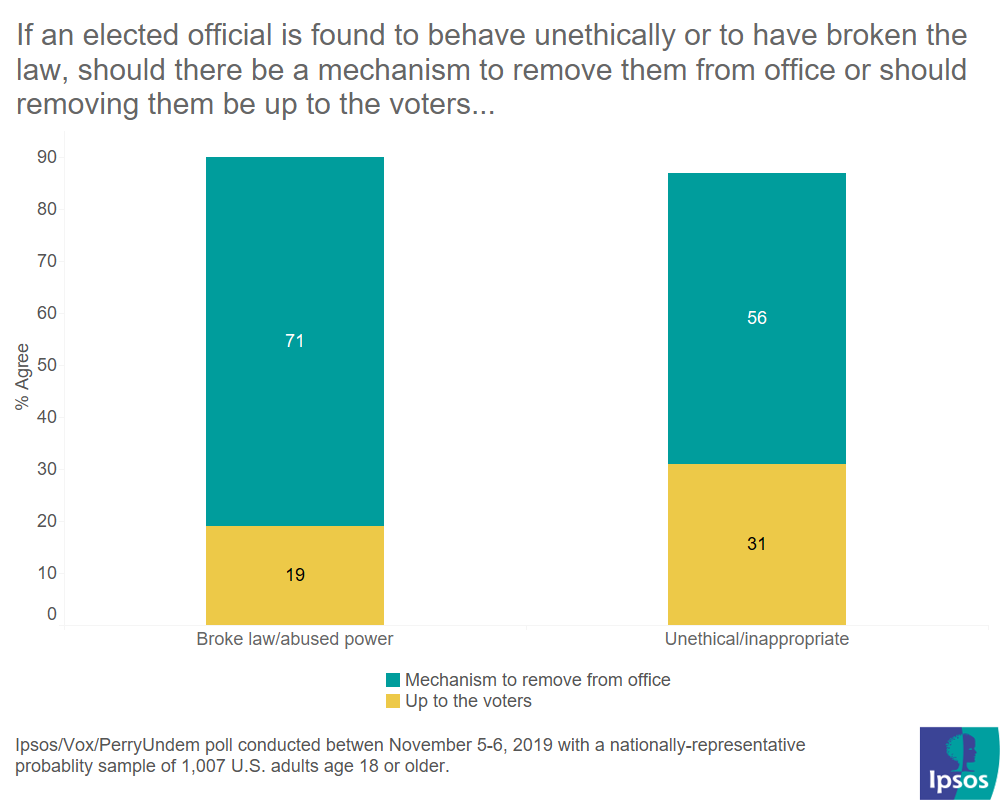
2. Q. When does the public believe impeachment should be used?
A. Public opinion is decidedly mixed about when impeachment should be applied but a majority believe it should not be applied frequently.
In the abstract, while there is widespread support for impeaching officials who have abused their power or broken the law, Americans disagree about how often impeachment should be employed. A little over a quarter of Americans (27%) do not favor a formal process to remove elected officials from office. An additional 27% support the idea of impeachment but believe it should be used only occasionally. Only 39% of Americans support impeachment and believe it should be applied against all bad behavior by elected officials.
Here and now, Republicans are less likely to favor an impeachment process (36% do not support) and are more likely to say it should be used only occasionally (30%) compared to Democrats where a majority (50%) believe impeachment should be used against all bad behaviors.
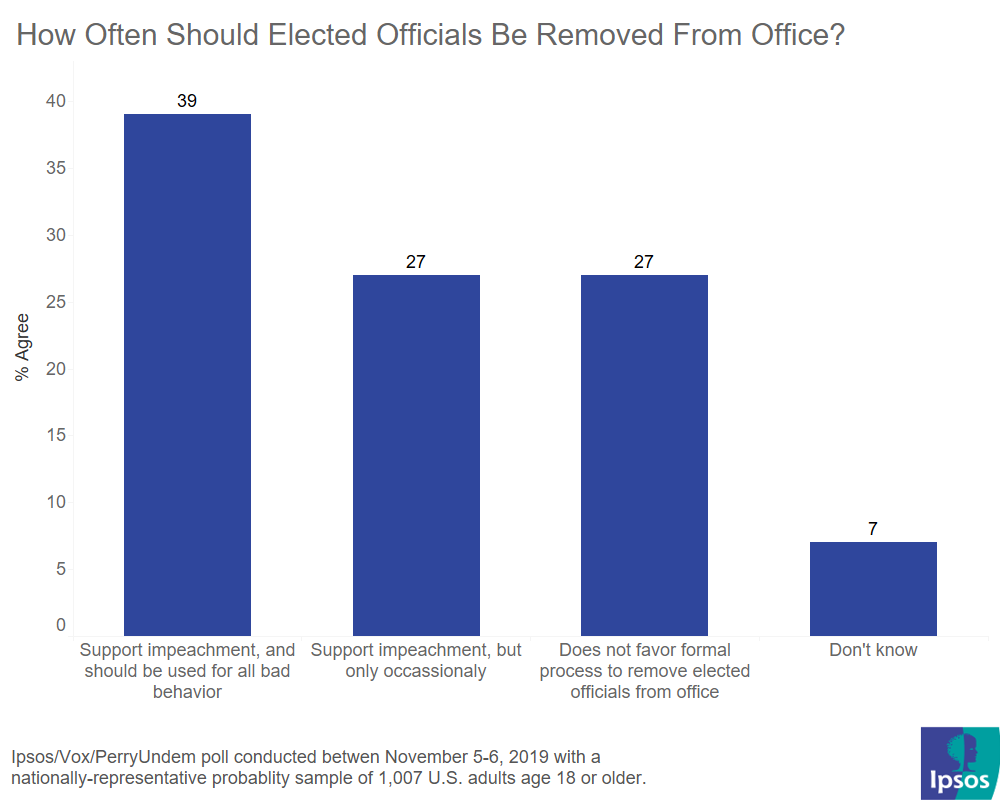
3. Q. What are high crimes and misdemeanors?
A. That’s up to Congress, but Americans have some ideas about what that phrase means.
At the conceptual level, there was wide support for categorizing an abuse of power for personal enrichment and misusing public funds or assets as high crimes and misdemeanors across all parties. Abusing the powers of your office for political advantage and neglecting the oath of office spurred a much more partisan reaction. Eight in ten people surveyed consider abusing the powers of office for political advantage as a high crime and misdemeanor. Two-thirds of Republicans consider that a high crime, while three-quarters of independents and nearly all Democrats (93%) view this as a high crime and misdemeanor.
Considering that one of the attacks being levied against President Trump is abusing the power of the presidency for political advantage, it is no surprise that respondents separated in this partisan manner. This speaks to the greater issue of impeachment: what an impeachable offense is can be subject to change based on the political environment.
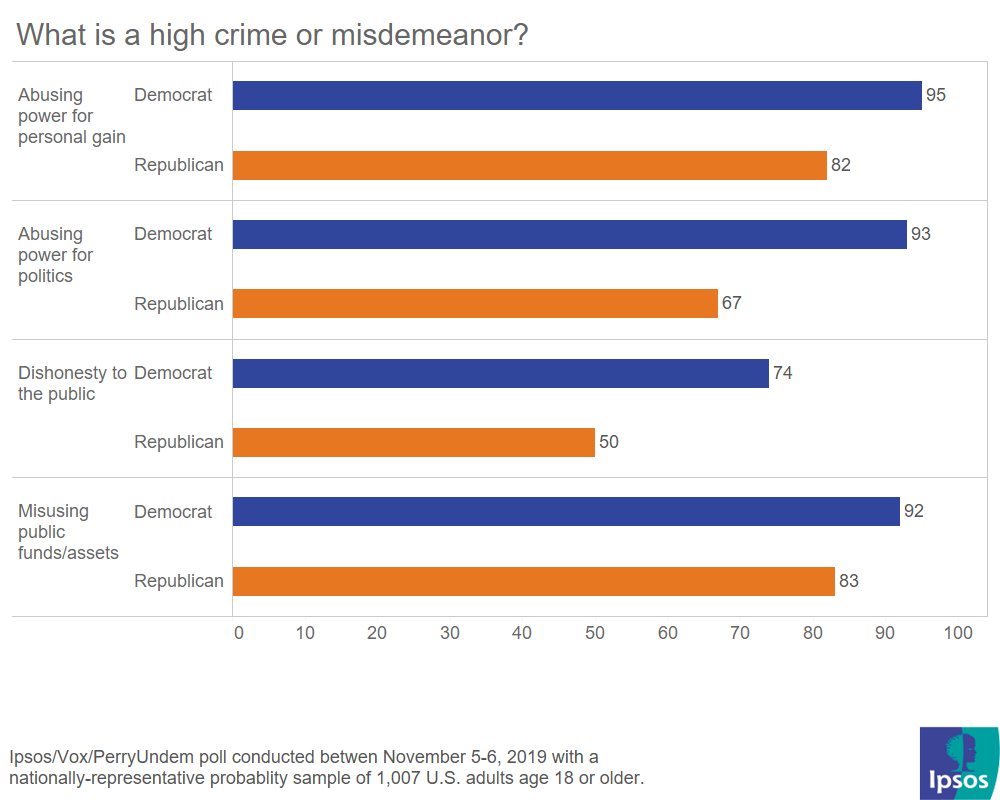
4. Q. Where do Americans stand on impeachment?
A. It depends on how you ask the question but somewhere between a plurality and majority of Americans support removing Trump from office.
In a recent ABC News/Ipsos poll, 51% of Americans said they were in favor of impeaching and removing the president, while an additional 6% of people surveyed were in favor of just impeachment. That puts the total support for impeachment to 57%, with nearly all of it driven by people who also favor the president being removed from office.
This compares to the average of about 45% of Americans supporting impeaching President Trump in our ongoing Reuters/Ipsos Core Political tracker. The difference in findings appears to be mainly attributed to the inclusion or exclusion of a specific “don’t know” option in the question response. The Reuters/Ipsos poll includes it resulting in 10-15% of Americans saying they “don’t know” while the ABC/Ipsos poll does not. It appears that when forced to make a choice, people who tend to say don’t know are more in favor of impeachment than against.
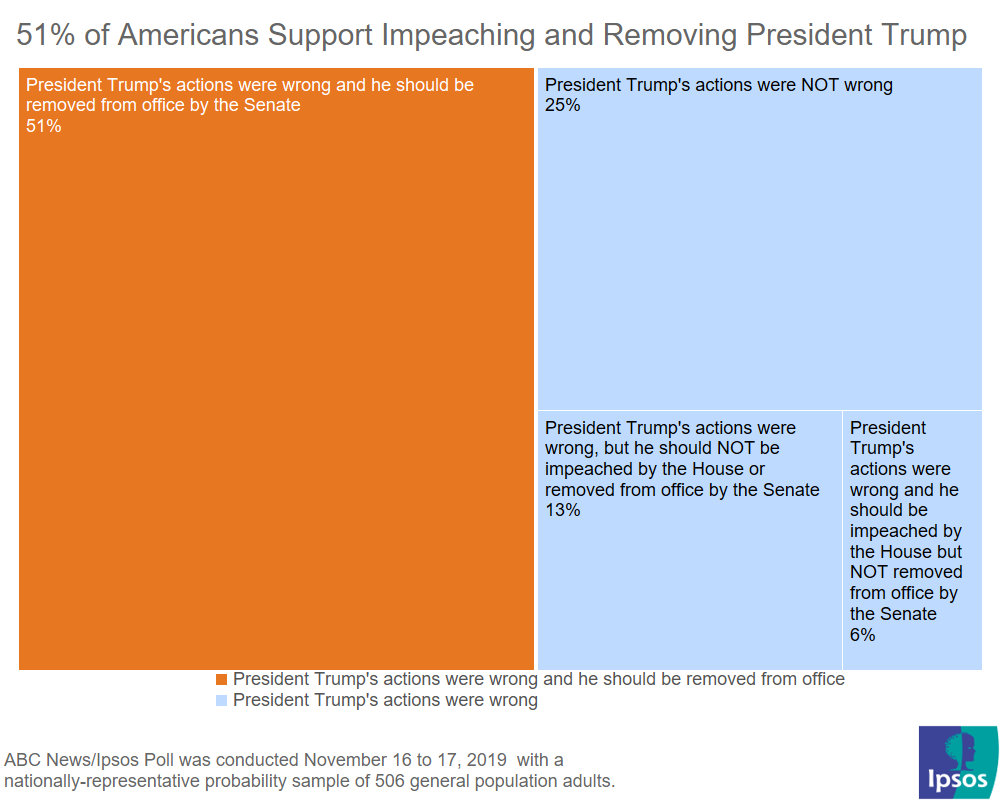
5. Q. Has American public opinion changed on impeachment?
A. Based on polling from our Reuters/Ipsos Core Political tracker, more Americans find the Ukraine scandal to be an impeachable offense compared to the Mueller report.
Support for impeaching President Trump has risen nearly ten percentage points after a whistleblower revealed details about a July call between Trump and Ukraine’s president. Most of the rise in impeachment approval came from Democrats and Independents. Republican support rose slightly but is still statistically significant.
Overall, the biggest jump in support for impeachment came from Independents, who seem to be moving away from the President. Support for impeachment has risen higher and lasted longer than it did at the previous high point during the Mueller investigation. Up until last week, support for impeachment has risen faster over the past five weeks than opposition to impeachment. The length of that streak was not statistically significant during the Mueller investigation. Though, these developments still have not cut into the President’s approval numbers.
However, since the start of the Ukraine-linked stage of the impeachment debate, public opinion has not moved significantly with around 45% of Americans supporting impeachment and 40% opposing impeachment.
6. Q. Is there a difference between people disapproving of the President’s actions and supporting impeachment?
A. Yes, recent polling makes this pretty clear.
Our recent ABC News/Ipsos poll asked a more nuanced version of a question on impeachment combining the ideas of moral wrong with removal from office. We found that Americans believe that President Trump’s actions detailed in the whistleblower complaint are wrong with 70% of Americans saying so. Still, there is a notable gap between people who believe Trump’s actions were wrong (70%); people who think President Trump should be impeached (57%); and people who believe President Trump should be impeached and removed (51%).
This polling suggests there is about 20% of the public who feel that the President engaged in problematic actions, but he should not be removed from office. It is only a minority (25%) who believe the President did nothing wrong. Combining these groups together produce the 45% of Americans who do not support impeachment.
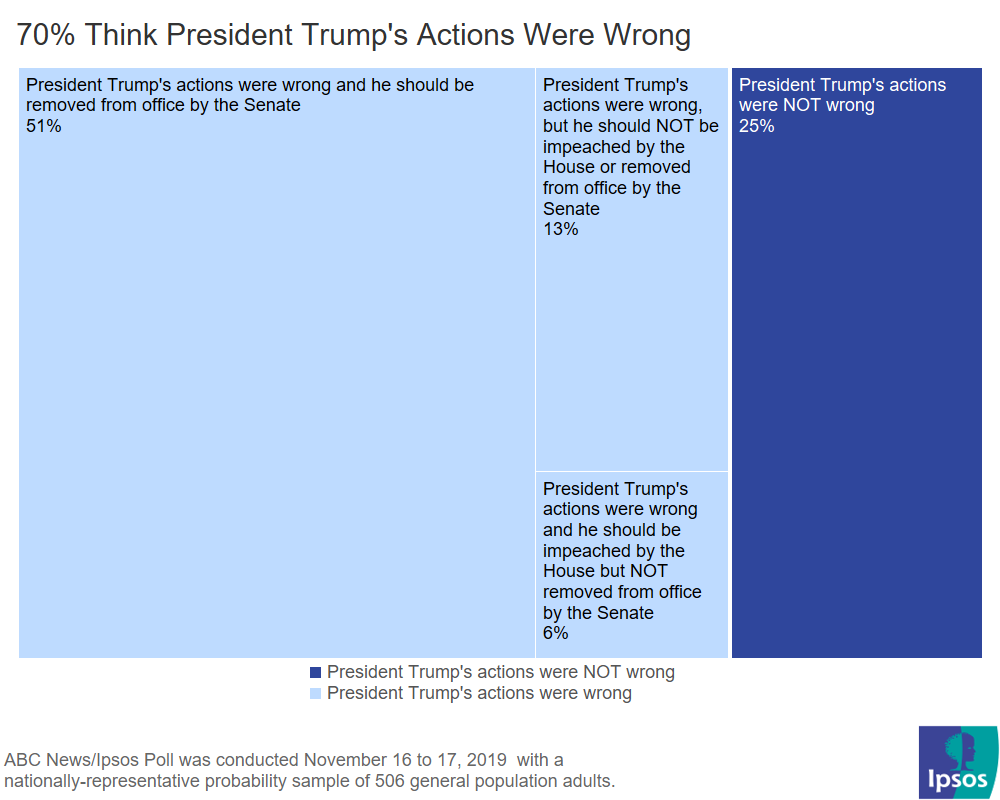
7. Q. Is all the television coverage of impeachment going anywhere with the public?
A. Yes and no, but TV is clearly the main way people are consuming information about the impeachment.
Television news and the televised impeachment hearings were among the top three ways people in the 538/Ipsos survey kept up-to-date on impeachment news. The televised hearings are designed for a TV audience, so the fact that people are tuning in (22%) or are watching via a TV news program (47%) may help Democrats make their case for impeachment. However, this round of hearings has grossed noticeably fewer views than the Mueller hearings and other recent Congressional hearings.
As President Trump demonstrated when he began tweeting about former U.S. Ambassador Marie Yovanovitch during the impeachment hearing, people don’t just watch TV anymore. They are watching TV, while tweeting and maybe even skimming articles, absorbing information from multiple channels at once. Commentary is baked into consumption. How information circulates after people initially watch it on TV determines the sound bites people walk away with, which influences how public opinion is shaped.
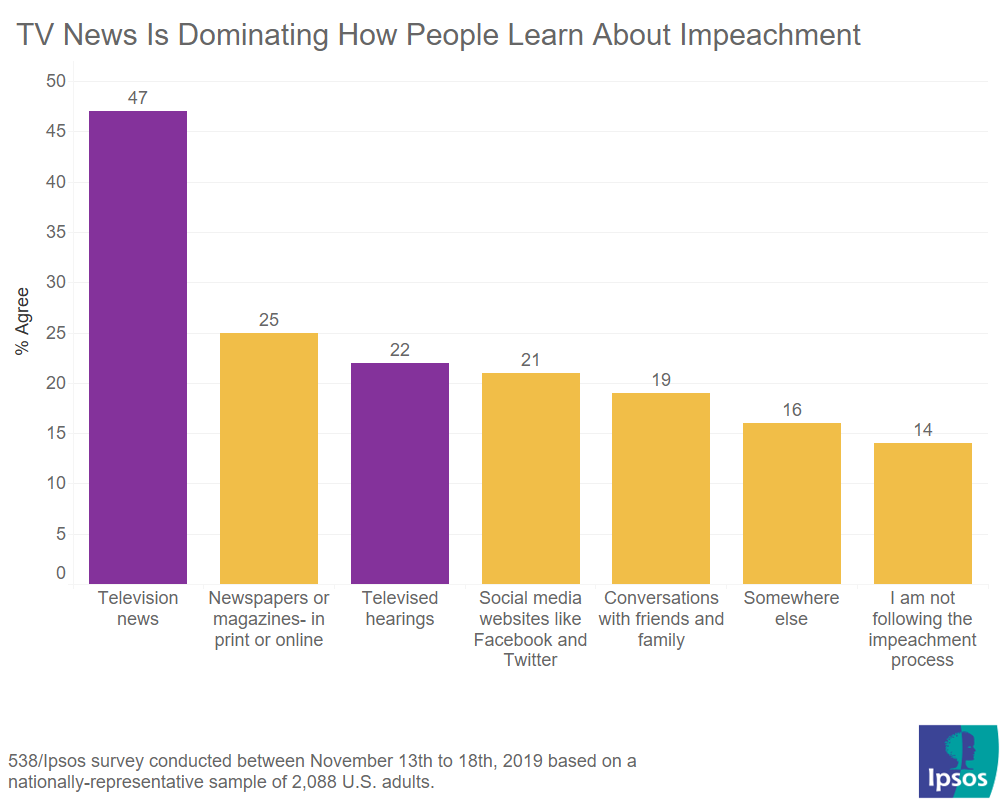
8. Q. Does the impeachment inquiry impact Democrats or Republicans running for office?
A. When it comes to how a vote to impeach or remove President Trump would impact Congressional representatives’ standing with the public, people are evenly split between negative, positive, and apathetic feelings.
As of now, our 538/Ipsos poll has the impact on Republican and Democratic members of Congress pretty sharply split with approximately a third of the public saying it would make them more favorable and a third less favorable.
Unsurprisingly, approval for how Congressional Democrats and Republicans have handled the impeachment process breaks down along partisan lines. Independents buck this trend, disapproving of how Congressional Republicans have dealt with impeachment (52%) at a higher rate than they have disapproved of Congressional Democrats (44%).
The ultimate impact is going to be driven by the makeup of each district. In districts with a close match or that lean Democratic, impeachment looks likely to help Democrats and hurt Republicans. In deep red districts the opposite will be true.
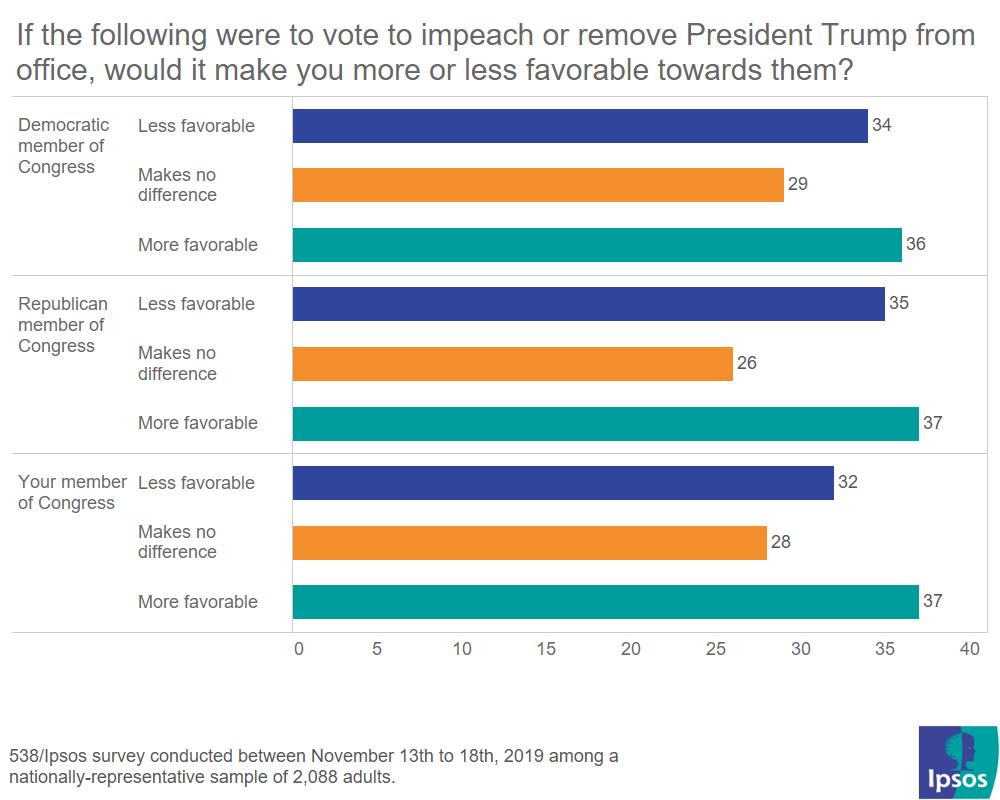
About Ipsos
Ipsos is now the third largest market research company in the world, present in 90 markets and employing more than 18,000 people.
Our research professionals, analysts and scientists have built unique multi-specialist capabilities that provide powerful insights into the actions, opinions and motivations of citizens, consumers, patients, customers or employees. Our 75 business solutions are based on primary data coming from our surveys, social media monitoring, and qualitative or observational techniques.
“Game Changers” – our tagline – summarizes our ambition to help our 5,000 clients to navigate more easily our deeply changing world.
Founded in France in 1975, Ipsos is listed on the Euronext Paris since July 1st, 1999. The company is part of the SBF 120 and the Mid-60 index and is eligible for the Deferred Settlement Service (SRD).
ISIN code FR0000073298, Reuters ISOS.PA, Bloomberg IPS:FP



